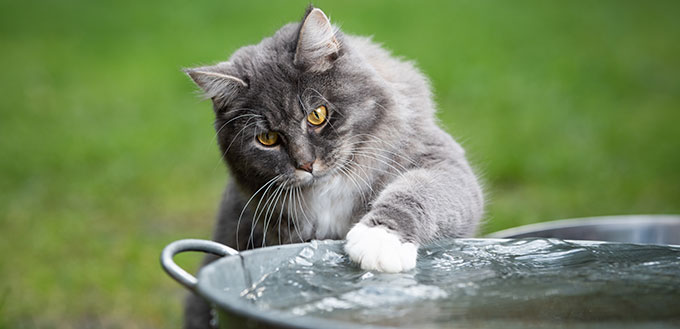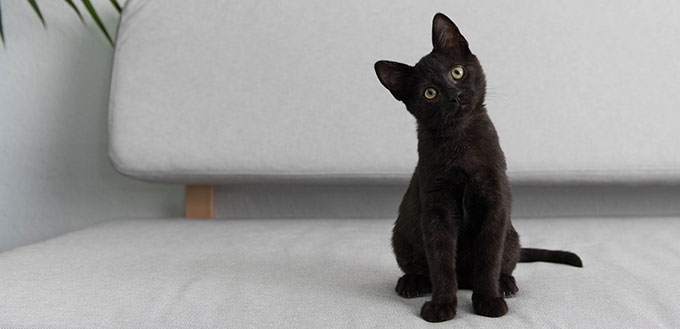“Curiosity killed the cat”, or so the saying goes. But does it really? Maybe the curious way your cat sunbathes or the way they rustle through the bushes is the exact reason they seem to live so long. So, why are cats so curious? Don’t worry, we’ve come to finally answer that long-asked question! We all want to know, and as it turns out, there’s a whole list of reasons for their curious nature. Take a look!

Cats Are Opportunists
Cats are highly intelligent creatures that absorb the world around them the same way as humans. They develop little routines and often walk the same routes each and every day. If the opportunity arises for them to explore and find something interesting, they’re unlikely to pass it up! Particularly if it’s a good hunting opportunity.
Cats are very bold owing to their predatory background. Even though they are also known to flee at the first sign of trouble, they love having the high ground. Even if nothing new really comes from it!
Survival Instincts
When it comes to our feline friends, curiosity is part of a cat’s natural survival instinct. In fact, it’s probably the most distinct reason for their curiosity. Have you ever noticed your cat snoozing away, without a care in the world? Next thing you know, they’re on their feet faster than you can say mouse? Well, that’s thanks to their natural survival instinct! There are plenty of factors that cause this kind of reaction, though most include endearingly entertaining and curious behaviors.
Sounds
What a lot of humans tend to forget is that a cat’s hearing is significantly more powerful than our own. We’re talking five times more powerful! If your cat hears a creak, knock, squeak, or even a simple bump, they are brought to sudden and full attention. To them, these sounds are intrusive and unfamiliar. Unfamiliarity doesn’t sit well with any cat, as most owners know. Many cats will immediately feel the need to investigate these sounds to reassure themselves that no predators are waiting to ambush them.
Movement
If your curious kitty thinks they have seen movement in the corner of their eye, or any other disruption to their environment, they will likely want to investigate. Sudden disturbances can cause anxiety in any cat! They may be natural predators, but they are also prey, so both fight or flight responses are very strong. They simply have to figure out which response is most appropriate at the time.
Safe Space
Here’s a fun fact: Cats love an awkward space. Things like cardboard boxes, laundry hampers, or even that gap behind the sofa. Surely you’ve wondered why that is. Well, we’re here to tell you! Cats squeezing themselves into ridiculously tight spots is another survival trait, believe it or not.
Survival, coupled with their curiosity, compels cats to explore hiding spaces that could prove useful in case of attack. We all know what you’re thinking. How can a shoebox prove helpful under attack? The thing is, domestic cats make use of what’s around them. Unlike other wild species that can utilize a larger, more natural environment, domestic cats can only utilize what we provide for them. Something like a cardboard box can provide cats with protection on four sides and shield their soft bellies while they are sleeping. Think of it like a cute little security box just for them!
Find out Do Cats Love Boxes so Much?

Practicing Their Hunting Skills
On the flip side, cats also have hunting instincts. Cats are predators, too, and their drive to hunt can be powerful, even with domesticated breeds. In the wild, cats could spend a large portion of their day looking for and hunting prey. This would become their food and fuel. Then, of course, they would need to look for places to rest and find water. Even after cats were domesticated and turned into pets, these predatory behaviors stayed still inside them. They are difficult to stamp out. We mainly see this instinct in the way they play with toys.
Cat Toys
The vast majority of cat toys are designed to look like small animals, such as a mouse. This animal choice should engage your cat’s curiosity and entice them to play. They will likely chase it as they would in the wild! Fortunately for the toy, domestic cats have become gentler creatures and their playstyle is a bit less rough. They mostly enjoy batting toys around and listening to the little jingle inside.
Cat Playtime
Cats, especially younger kittens, enjoy slinking around their home, knocking over water bowls, and climbing all over people. But they especially love to play! Playtime with a young cat often entails ruffling their fur and watching how they respond. What you may not realize is that your curiosity is mirrored in their curiosity. They want to know what you might do next! This game is a fantastic way to encourage cats to study the behavior of other creatures. By studying, they’ll heighten their own response times. It’s just like what they would learn in the wild, only better!
Exploration
Cat curiosity isn’t just explained away by their natural survival or hunting instinct. They are also natural-born explorers! If cat toys aren’t available, they will just have to settle their curiosity in a different way. For example, figuring out why their human’s toes keep moving and wiggling around. If your cat decides to fix the problem, then watch out! You’re about to receive a tiny nibble. Cats also like to ask: What noise does a vase make when it hits the floor? Their response? Push it off and see what happens! A cat’s curiosity is both endearing and a real pain. But just like you, they’re only trying to figure out the world in the only way they know how: Exploration. (Come on, admit it – we all ate grass as a kid to see what it tasted like!)
You may even find that your cat spends 80% of its time outside of the home, wandering the neighborhood and meeting other cats and people. If not, they’re certainly staring out the window, tail twitching as they study everything that’s happening around them. It’s a healthy way for them to satisfy their curiosity. It’s certainly not something to worry about. If you are letting your cat explore outside the house, just make sure they are spayed, neutered, wormed, and tagged. It doesn’t hurt to treat them for fleas and ticks, too! That way, you will have done everything you can to keep them safe. The rest they have to figure out on their own!

Curious Like a Cat
The more curious a cat is, the more likely they will come to you. Some cats might even follow you from room to room, even if you’re just getting yourself a drink. Believe it or not, these cats are experiencing what we humans like to call, “the fear of missing out”. That’s right – even your curious cat feels it! They need to be wherever you are to be sure they’re not missing out on anything. You see this a lot in kittens as they start to create their bond with you. They can’t bear to let you out of their sight!
When it comes to cat curiosity, there’s a lot more to it than you might think. But without it, cats certainly wouldn’t be the charming, loveable, and sometimes a little loopy, felines that we know and love today.






